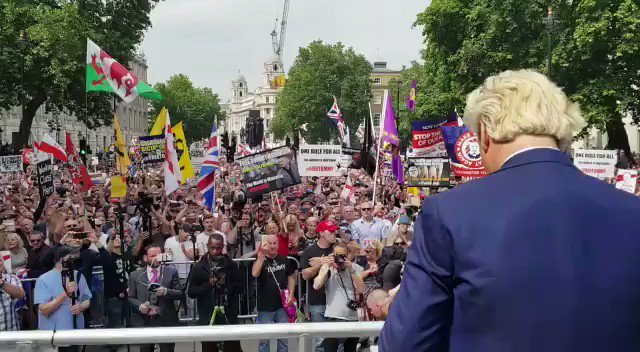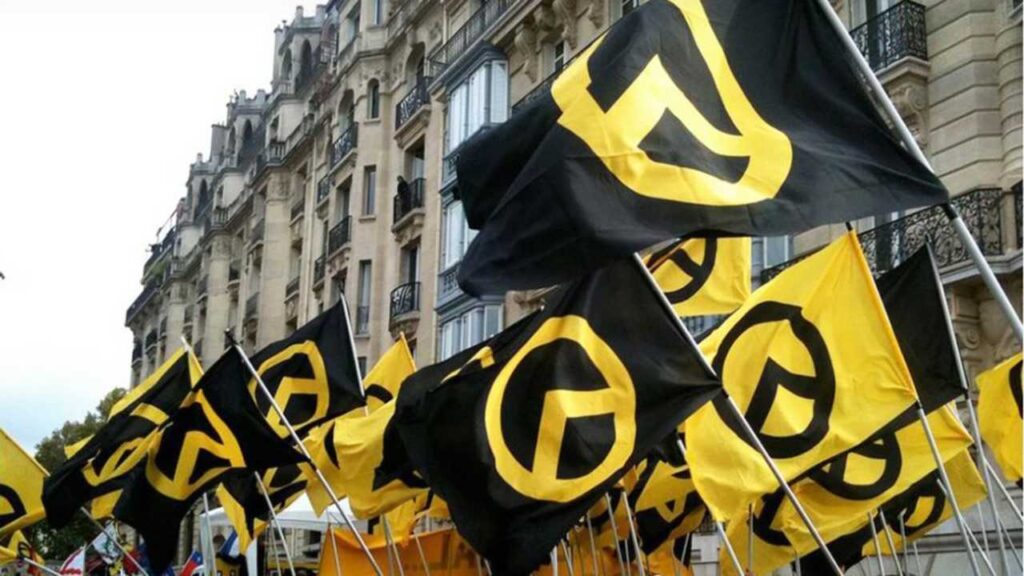What’s in a name? Recent developments on the far right
Allan Todd writes: Over the past decade or so, several countries – including the US, Hungary, Poland, Italy, Denmark and the UK – have experienced right-wing governments adopting, to varying degrees, racism and/or a range of racist ‘solutions’. In addition, a definite pattern of hard-right ‘coalitions’ has emerged – with Steve Bannon (a roving ambassador of the ‘Alt-Right’) still attempting to establish his ‘Nationalist International’ – along with wealthy individuals and organisations willing to fund such ventures. As a result, anti-fascists and academics have been trying to come up with a term to define the undoubted – and worrying – growth of these hard-right and far-right political movements.
Neil Faulkner, in the Transform pamphlet, Far Right on the Rise (2018) – and then in the excellent book, Creeping Fascism: what it is and how to fight it (2019) – has coined the term ‘creeping fascism’. Whilst Enzo Traverso talks of ‘post-fascism’ – as opposed to outright ‘neo-fascism’ – in The New Faces of Fascism: Populism and the Far Right (2019).
Liz Fekete, in her book Europe’s Fault Lines: Racism and the Rise of the Far Right (2018), has spoken of ‘hard-right populism and ultra-nationalist’ electoral platforms; while Roger Eatwell & Matthew Goodwin in National Populism: The Revolt Against Liberal Democracy (2018), identified what they’ve called ‘national populism’.
Along with the rise to power of hard-right political parties such as Fidesz in Hungary, PiS (Law and Justice) in Poland and the Lega in Italy, there has also been a corresponding growth in organisations – in the UK and in many other European countries – that seem more obviously fascist. There is also increasing co-operation between mainstream hard right political movements and fascist street gangs.
The growing influence of these linked hard-right/ far-right organisations can be seen, for instance, in the big rallies they have been able to organise in recent years:
Examples of far-right rallies and demonstrations, 2017-18
[adapted from Neil Faulkner, et al., Creeping Fascism, 2019, p.143]
|
PLACE |
DATE |
SIZE AT PEAK |
OCCASION |
|
Warsaw, Poland |
11 Nov. 2017 |
60,000 |
March of Independence* |
|
Budapest, Hungary |
15 March 2018 |
100,000 |
Pro-Fidesz election rally |
|
London, Britain |
9 June 2018 |
15,000 |
Free ‘Tommy Robinson’ protest |
|
Warsaw, Poland |
11 Nov. 2018 |
200,000 |
March of Independence* |
|
Rome, Italy |
8 Dec. 2018 |
50,000 |
Pro-Lega/Salvini rally |
* Mainly organised by Polish far right organisations
The far right in Britain
In the UK, June 2018 saw around 15,000 hard right and far right/fascist attendees at a ‘Free Tommy Robinson’ rally – bigger than any of Mosley’s BUF rallies in the 1930s. This gathering was evidence both of a new ‘coalition’ of the right, and of its international links, as it was addressed by UKIP’s Gerard Batten and the rightwing Dutch MP, Geert Wilders:

Geert Wilders at the ‘Free Tommy Robinson’ rally, London, 9 June 2018
Gerard Batten of UKIP was also a speaker.
In addition to the usual UK ‘suspects’ – including contingents from UKIP, the DFLA, National Front (NF), BNP, For Britain and Britain First – also present in that rally were Generation Identity, underlying the growing international links between far right groups:

Generation identity and its lambda symbol
These international links are also shown by the increasing presence in the UK of branches of European fascist groups. The National Movement (RN), the main fascist party in Poland – and similar groups like Independent Poland (PN) & the Link (O) – are active in the UK; while it seems money from the Polish foreign ministry has been used to help organise bookfairs, street events and Nazi concerts in the UK. One Link activist is also a member of the North West Infidels – a fascist split from the EDL – whilst there are also individual links to the Traditional Britain Group (TBG).
In addition, the UK’s far right groups are increasingly linked to more ‘mainstream’ hard right political groups: for instance, the Bruges Group (which, as this summer’s issue of Searchlight reveals, has had Home Secretary Priti Patel as a speaker on two occasions) is linked to UKIP, the Brexit Party and even Germany’s AfD.
In addition, Bruges Group meetings have been attended by members of the NF, the BNP and the TBG. The TBG itself has links with the Northern League and Generation Identity – whilst prominent Polish fascists attended its annual conference last year. The UK’s newest fascist party is the Patriotic Alternative, set up the BNP’s former youth organiser. Such groups are also increasingly funded by organisations which include the Heritage Foundation; whilst the fascist publishing house Arktos helps distribute their far right literature, and spreads their right-wing views via mass social media.
Not the 1930s, but…
Most would probably agree that, in the main, this is not a re-run of the 1930s, and that the real threat today doesn’t come from old-style fascist groups.
However, there are important lessons to be learned from the 1930s. One is that the threats posed by far right political movements cannot be ignored – otherwise, it will be too late. The other main lesson is that opposition to these right-wing trends has to be in the form of a united front. The lack of co-operation between the SDP and the KPD in Germany before 1933 showed the truth of the saying: “Stand together – or hang separately!”
What’s in a name?
In the end, it’s not crucial that all anti-racists and anti-fascists agree on one term to apply to these new hard-right and far-right parties, movements and organisations. As Juliet Capulet says to Romeo Montague:
“What’s in a name? That which we call a rose,
By any other name, would smell as sweet.”
Or, of course, ‘That which we call fascism, by any other name, would smell as rank’!! Although George Monbiot doesn’t call it fascism, he makes a crucial point:
“Though it has characteristics in common, this isn’t fascism. It is something else, something we have not yet named. But we should fear it and resist it as if it were.” [emphasis added]
So, whether we call it ‘creeping fascism’, ‘post-fascism’ or ‘national populism’ – or something else – it still smells far from “sweet”. The important thing is to recognise the threat posed by these recent developments, face up to them, and take action – together – in order to contain and then reduce that threat.
Allan Todd is a member of Left Unity, an ecosocialist/environmental and anti-fascist activist, and author of Revolutions 1789-1917
Left Unity is active in movements and campaigns across the left, working to create an alternative to the main political parties.
About Left Unity
Read our manifesto
Left Unity is a member of the European Left Party. 
Read the European Left Manifesto
ACTIVIST CALENDAR
Events and protests from around the movement, and local Left Unity meetings.

Saturday 19th July: End the Genocide – national march for Palestine
Join us to tell the government to end the genocide; stop arming Israel; and stop starving Gaza!
Summer University, 11-13 July, in Paris
Peace, planet, people: our common struggle
The EL’s annual summer university is taking place in Paris.
More events »
GET UPDATES
Sign up to the Left Unity email newsletter.
CAMPAIGNING MATERIALS
Get the latest Left Unity resources.


